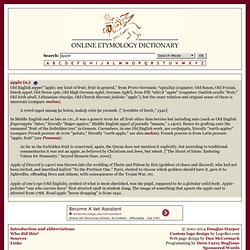

Online Etymology Dictionary. Old English æppel "apple; any kind of fruit; fruit in general," from Proto-Germanic *ap(a)laz (cognates: Old Saxon, Old Frisian, Dutch appel, Old Norse eple, Old High German apful, German Apfel), from PIE *ab(e)l "apple" (cognates: Gaulish avallo "fruit;" Old Irish ubull, Lithuanian obuolys, Old Church Slavonic jabloko "apple"), but the exact relation and original sense of these is uncertain (compare melon).

A roted eppel amang þe holen, makeþ rotie þe yzounde. ["Ayenbite of Inwit," 1340] In Middle English and as late as 17c., it was a generic term for all fruit other than berries but including nuts (such as Old English fingeræppla "dates," literally "finger-apples;" Middle English appel of paradis "banana," c.1400). Hence its grafting onto the unnamed "fruit of the forbidden tree" in Genesis.
Cucumbers, in one Old English work, are eorþæppla, literally "earth-apples" (compare French pomme de terre "potato," literally "earth-apple;" see also melon). Malum - Digital Forcellini. Malum - Forcellini. Mela in Vocabolario. -Vocabolario degli Accademici della Crusca - Pomo; POMO. Pomum - Forcellini. Pomum - Digital Forcellini. DIZIONARIO LATINO OLIVETTI. Europe etymology maps 1.